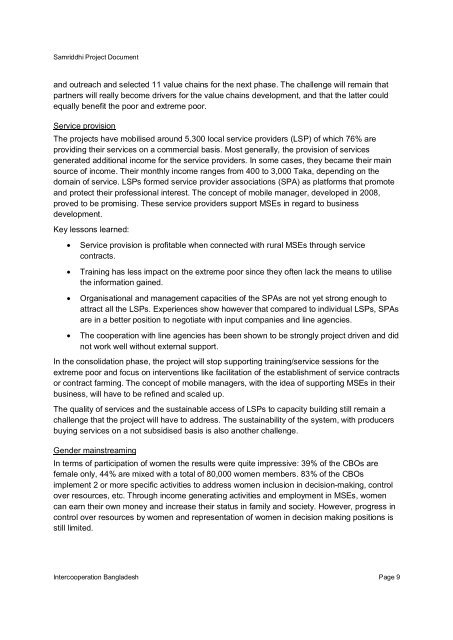Samriddhi
Samriddhi
Samriddhi
Create successful ePaper yourself
Turn your PDF publications into a flip-book with our unique Google optimized e-Paper software.
<strong>Samriddhi</strong> Project Document<br />
and outreach and selected 11 value chains for the next phase. The challenge will remain that<br />
partners will really become drivers for the value chains development, and that the latter could<br />
equally benefit the poor and extreme poor.<br />
Service provision<br />
The projects have mobilised around 5,300 local service providers (LSP) of which 76% are<br />
providing their services on a commercial basis. Most generally, the provision of services<br />
generated additional income for the service providers. In some cases, they became their main<br />
source of income. Their monthly income ranges from 400 to 3,000 Taka, depending on the<br />
domain of service. LSPs formed service provider associations (SPA) as platforms that promote<br />
and protect their professional interest. The concept of mobile manager, developed in 2008,<br />
proved to be promising. These service providers support MSEs in regard to business<br />
development.<br />
Key lessons learned:<br />
• Service provision is profitable when connected with rural MSEs through service<br />
contracts.<br />
• Training has less impact on the extreme poor since they often lack the means to utilise<br />
the information gained.<br />
• Organisational and management capacities of the SPAs are not yet strong enough to<br />
attract all the LSPs. Experiences show however that compared to individual LSPs, SPAs<br />
are in a better position to negotiate with input companies and line agencies.<br />
• The cooperation with line agencies has been shown to be strongly project driven and did<br />
not work well without external support.<br />
In the consolidation phase, the project will stop supporting training/service sessions for the<br />
extreme poor and focus on interventions like facilitation of the establishment of service contracts<br />
or contract farming. The concept of mobile managers, with the idea of supporting MSEs in their<br />
business, will have to be refined and scaled up.<br />
The quality of services and the sustainable access of LSPs to capacity building still remain a<br />
challenge that the project will have to address. The sustainability of the system, with producers<br />
buying services on a not subsidised basis is also another challenge.<br />
Gender mainstreaming<br />
In terms of participation of women the results were quite impressive: 39% of the CBOs are<br />
female only, 44% are mixed with a total of 80,000 women members. 83% of the CBOs<br />
implement 2 or more specific activities to address women inclusion in decision-making, control<br />
over resources, etc. Through income generating activities and employment in MSEs, women<br />
can earn their own money and increase their status in family and society. However, progress in<br />
control over resources by women and representation of women in decision making positions is<br />
still limited.<br />
Intercooperation Bangladesh Page 9
















